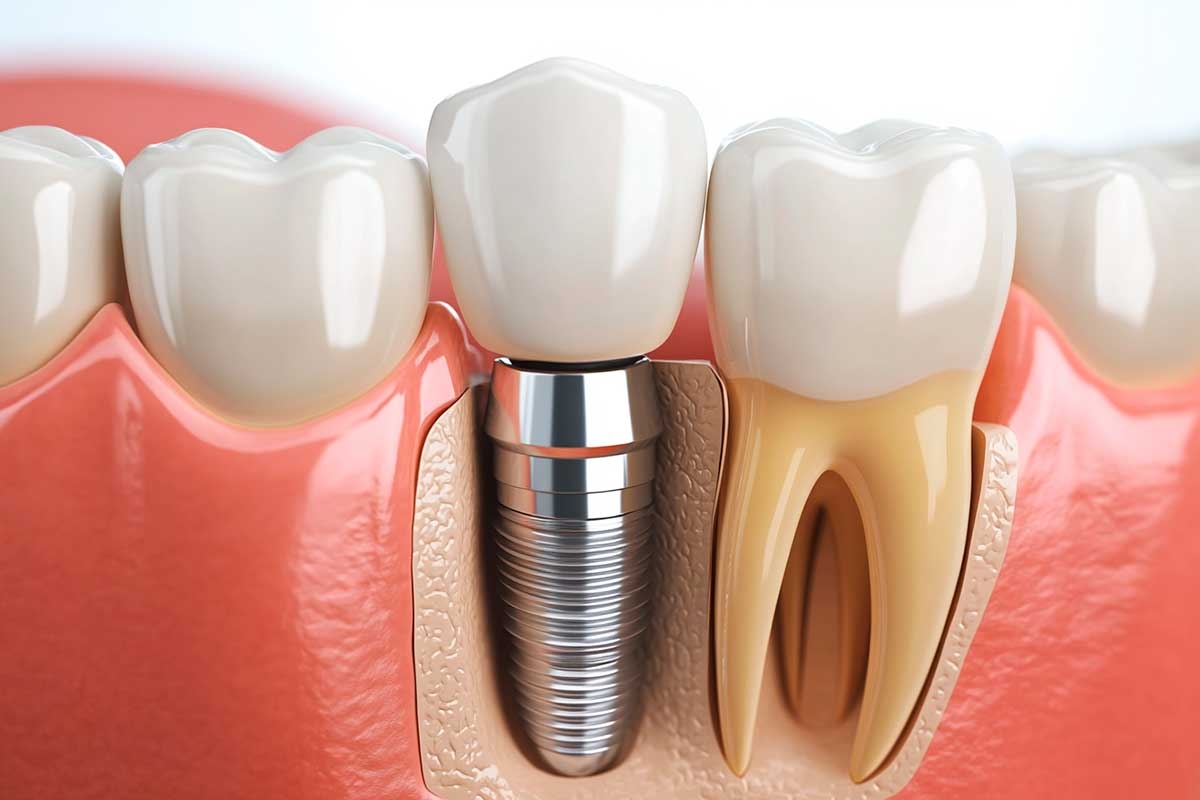
Dental Implant Treatment
Watch our video about Dental Implant Treatment
A dental implant is a long-term solution for replacing missing teeth. It consists of a titanium post surgically placed into the jawbone, acting as an artificial root. This implant supports a dental crown, bridge, or denture, restoring both function and aesthetics to the patient's smile.
Dental implants provide stability and durability that traditional dentures or bridges cannot offer. They integrate with the bone through a process called osseointegration, ensuring a strong and natural-looking result that can last for many years.
What Causes the Need for a Dental Implant?
Several factors can lead to tooth loss, making a dental implant necessary. Some common causes include:
- Tooth decay – Severe cavities that damage the tooth beyond repair.
- Periodontal disease – Gum infections that weaken the bone structure.
- Trauma or injury – Accidents leading to missing or fractured teeth.
- Congenital conditions – Some people are born missing certain teeth.
- Failed root canal treatments – When endodontic treatments do not succeed.
- Excessive tooth wear – From grinding (bruxism) or acid erosion.
- Tooth extraction – When a damaged or infected tooth is removed, leaving a gap.
How to Prevent the Need for a Dental Implant?
Although dental implants provide an excellent solution for missing teeth, prevention is always the best approach. Some key preventive measures include:
- Regular dental check-ups to monitor oral health and detect problems early.
- Proper oral hygiene, including brushing and flossing daily.
- Avoiding excessive sugar intake to reduce the risk of cavities.
- Wearing mouthguards to prevent trauma from sports or bruxism.
- Treating gum disease early to prevent tooth loss.
- Avoiding smoking to maintain gum and bone health.
- Replacing missing teeth quickly to prevent bone loss and further dental issues.
What are the Treatments for Tooth Loss?
There are several treatment options for replacing missing teeth, including:
- Dental implants – A permanent solution that replaces missing teeth.
- Fixed bridges – A prosthetic option that connects artificial teeth to adjacent natural teeth.
- Partial dentures – Removable options for replacing multiple missing teeth.
- Complete dentures – Full replacements for patients who have lost all teeth.
- Bone grafting – Used in cases where there is insufficient bone for implant placement.
- Orthodontics – To correct gaps caused by missing teeth and shift remaining teeth into place.
- Gum grafting – Helps in cases where gum loss has affected tooth stability.
What are the Advantages of Getting a Dental Implant?
Dental implants offer several benefits over traditional tooth replacement methods:
- Durability – They can last a lifetime with proper care.
- Natural appearance – They look and feel like real teeth.
- Improved speech – Unlike dentures, they do not slip, allowing clear speech.
- Better comfort – They integrate with the jawbone, providing a secure fit.
- Easier eating – Implants function like natural teeth, making chewing effortless.
- Prevention of bone loss – They stimulate bone growth and prevent deterioration.
- Enhanced self-confidence – They restore a complete smile, improving overall aesthetics.
How Long Does the Treatment Last?
The dental implant process typically takes several months, depending on individual cases. The healing phase after implant placement can take 3 to 6 months for complete osseointegration. After this, the final prosthetic tooth is attached. With proper maintenance, dental implants can last a lifetime, requiring only regular cleanings and check-ups.
Who is a Candidate for Dental Implants?
This treatment is ideal for individuals who:
- Have one or more missing teeth.
- Have sufficient bone density in the jaw.
- Are in good overall health.
- Do not have active periodontal disease.
- Are non-smokers or willing to quit.
- Are looking for a long-term and stable tooth replacement.
Alternatives for Those Who Cannot Get Dental Implants
For patients who are not suitable for implants, alternative options include:
- Fixed bridges – Supported by adjacent teeth instead of implants.
- Removable dentures – Used when multiple teeth are missing.
- Mini implants – A less invasive implant alternative.
- Bone grafting – For those who lack sufficient bone density for standard implants.
- Resin-bonded bridges – Aesthetic options for replacing missing front teeth.
- Orthodontic treatments – To close small gaps instead of replacing missing teeth.
- Gum and soft tissue grafting – To improve oral health and support future treatments.
Schedule Your Dental Implant Consultation Today!
The Clinic Consultation offers high-quality dental implant treatments performed by experienced professionals. If you're considering restoring your smile, book an appointment with our specialists in dental implants today. Contact us now to schedule a consultation and take the first step toward a healthier and more confident smile!
Click here to schedule an appointment online